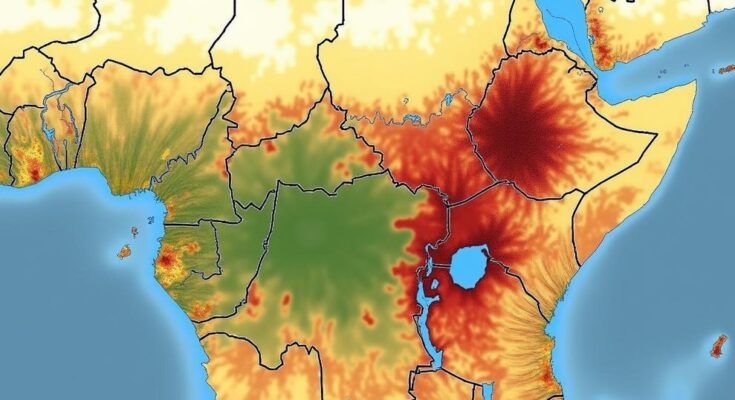The 2023/2024 El Niño has resulted in severe drought conditions across Southern Africa, affecting food security for approximately 23 million individuals. The region faces critical humanitarian challenges, including malnutrition and disease outbreaks, necessitating urgent intervention.
The ongoing El Niño event of 2023/2024 has precipitated unprecedented drought conditions throughout Southern Africa. This climatic phenomenon has resulted in late rain onset, prolonged dry spells, and extremely high temperatures, marking it as the worst occurrence in the last forty years. The ongoing drought has severely impacted communities already contending with the adverse effects of failed crops and challenging economic conditions. It is characterized by acute food shortages, restricted access to clean water, disease outbreaks, and significant livestock losses. The drought has been particularly dire, leading to drastically reduced maize harvests compared to five-year averages, as evidenced by national government reports and analyses from FEWS NET. Communities struggling for sustenance have not only depleted their stored food resources but now face months without the prospect of the next harvest until April 2025. Approximately 23 million individuals are currently experiencing critical food insecurity, with the countries of Malawi, Zambia, Zimbabwe, and Mozambique being the most severely affected. Furthermore, it is estimated that between 14 and 14.9 million people will require immediate humanitarian assistance during the upcoming lean season from October to December 2024. Six nations—Botswana, Lesotho, Malawi, Namibia, Zambia, and Zimbabwe—have declared national drought disasters, while Angola and Mozambique face substantial distress, with approximately 1.8 million people in Angola and 3.3 million in Mozambique projected to be food insecure. In 2024, more than 2 million children are anticipated to suffer from acute malnutrition, including over 500,000 cases of severe wasting. These extreme weather events have led to large-scale displacement of populations, outbreaks of diseases, shortages of food, and water scarcity, which have had devastating effects on agricultural productivity. Furthermore, this crisis has emerged at a time when the region is already confronting significant health challenges, including one of the worst cholera epidemics in decades. Despite a relative stabilization of the choleral situation, water scarcity continues to compromise hygiene and sanitation, posing a persistent threat of outbreaks in nations such as Malawi and Mozambique. The effects of drought on public health are multi-faceted, potentially escalating the risks of HIV and AIDS transmissions, exacerbating mental health issues, and increasing incidents of gender-based violence. This scenario highlights the pressing necessity for enhanced preparedness and responsive measures against evolving public health issues. Southern Africa is currently facing the compounded effects of El Niño, cholera outbreaks, ongoing conflicts, and the overarching consequences of climate change, all of which severely disrupt health systems and hinder access to essential sexual and reproductive health services. The calamity has also led to the internal displacement of over one million individuals due to disasters and climate change, primarily from Malawi, Mozambique, and Zimbabwe. The region’s already fragile situation necessitates immediate and robust intervention to mitigate the dire humanitarian impacts of this unprecedented drought.
Southern Africa’s vulnerability to climatic disturbances has been exacerbated by the 2023/2024 El Niño event, which has resulted in severe drought conditions across multiple countries. This phenomenon has highlighted the region’s struggle with food insecurity, water scarcity, and health emergencies. The current food crisis, marked by historic declines in agricultural yields and rising malnutrition rates among children, is further compounded by ongoing outbreaks of diseases such as cholera, creating a dire humanitarian situation that requires urgent attention.
In summary, the prolonged drought induced by the 2023/2024 El Niño event has profoundly impacted Southern Africa, causing extensive food insecurity, health crises, and displacement. The intersection of environmental, economic, and health challenges underscores the urgent necessity for coordinated humanitarian efforts and effective response strategies to support affected populations and strengthen resilience against future crises.
Original Source: reliefweb.int




